#labor feminism
Explore tagged Tumblr posts
Note
SW is a majorly fucked up and exploitative industry but since OF is self-employed I think it functions differently from a pimping or studio model. Ofc there might still be powers the website has over you, Idk those details. I would still think it would be a lot less than a pimp or John could have over you in-person.
You're correct that there is less direct interpersonal exploitation, however there is still significant social coercion due to capitalism.
I am NOT anti sex worker. I fully believe sex workers should be protected and there ARE ways to minimize potential exploitation. OF can be one although you never know what goes on behind the camera. Legalization and regulation are necessary but the Nordic model actively harms sex workers.
My critique of the sex industry comes from a labor feminist standpoint and honestly extends beyond just the sex worker industry as a larger labor critique. I believe all labor is exploitative when people are unable to have full autonomy when deciding how they want to labor. Under capitalism, no one has full autonomy in choosing their profession because we are all coerced by financial need. Sex work is scrutinized far more harshly because it is a female-dominated field. However, there is still valid feminist critique of SW as an industry. In sex work, (primarily) women are expected to "sell their body" like all other physical laborers, but they are also expected to sell the experience of intimacy in a way that even traditional customer service roles do not.
I find Catharine MacKinnon to be largely repulsive due to her blatant ignorance regarding lesbians and BDSM (as well as her bioessentialist beliefs that all men are pre-destined to be rapists due to male sexual desire) however she was correct about one thing:
If prostitution is a free choice, why are the women with the fewest choices the ones most often found doing it?
Catharine MacKinnon (1993) “Prostitution and Civil Rights”. Michigan Journal of Gender & Law vol 1 https://repository.law.umich.edu/cgi/viewcontent.cgi?article=1192&context=mjgl
MacKinnon rightfully points out that women who are already marginalized and exploited are more likely to enter the sex work industry. Why is this? Capitalism.
I have written a short paper on feminist labor critique (covering both sex work and domestic labor) and I will publish it to my substack when I find the time to re-edit it.
#replies from the stars#sw#pro sw#feminist labor#labor feminism#feminism#labor rights#radfems dni#anti swerf#fuck swerfs
4 notes
·
View notes
Text

Truck comes first and if there is any money left over the kids may eat. - Modern Consumer Patriarchy
#heterorealism#gender equality#men ain't shit#divorce him#feminism#wages for housework#domestic labor#working class women#blue collar women#fuck the patriarchy
40K notes
·
View notes
Text
As I keep shouting into the void, pathologizers love shifting discussion about material conditions into discussion about emotional states.
I rant approximately once a week about how the brain maturity myth transmuted “Young adults are too poor to move out of their parents’ homes or have children of their own” into “Young adults are too emotionally and neurologically immature to move out of their parents’ homes or have children of their own.”
I’ve also talked about the misuse of “enabling” and “trauma” and “dopamine” .
And this is a pattern – people coin terms and concepts to describe material problems, and pathologization culture shifts them to be about problems in the brain or psyche of the person experiencing them. Now we’re talking about neurochemicals, frontal lobes, and self-esteem instead of talking about wages, wealth distribution, and civil rights. Now we can say that poor, oppressed, and exploited people are suffering from a neurological/emotional defect that makes them not know what’s best for themselves, so they don’t need or deserve rights or money.
Here are some terms that have been so horribly misused by mental health culture that we’ve almost entirely forgotten that they were originally materialist critiques.
Codependency What it originally referred to: A non-addicted person being overly “helpful” to an addicted partner or relative, often out of financial desperation. For example: Making sure your alcoholic husband gets to work in the morning (even though he’s an adult who should be responsible for himself) because if he loses his job, you’ll lose your home. https://www.nytimes.com/2022/07/08/opinion/codependency-addiction-recovery.html What it’s been distorted into: Being “clingy,” being “too emotionally needy,” wanting things like affection and quality time from a partner. A way of pathologizing people, especially young women, for wanting things like love and commitment in a romantic relationship.
Compulsory Heterosexuality What it originally referred to: In the 1980 in essay "Compulsory Heterosexuality and Lesbian Existence," https://www.journals.uchicago.edu/doi/abs/10.1086/493756 Adrienne Rich described compulsory heterosexuality as a set of social conditions that coerce women into heterosexual relationships and prioritize those relationships over relationships between women (both romantic and platonic). She also defines “lesbian” much more broadly than current discourse does, encompassing a wide variety of romantic and platonic relationships between women. While she does suggest that women who identify as heterosexual might be doing so out of unquestioned social norms, this is not the primary point she’s making. What it’s been distorted into: The patronizing, biphobic idea that lesbians somehow falsely believe themselves to be attracted to men. Part of the overall “Women don’t really know what they want or what’s good for them” theme of contemporary discourse.
Emotional Labor What it originally referred to: The implicit or explicit requirement that workers (especially women workers, especially workers in female-dominated “pink collar” jobs, especially tipped workers) perform emotional intimacy with customers, coworkers, and bosses above and beyond the actual job being done. Having to smile, be “friendly,” flirt, give the impression of genuine caring, politely accept harassment, etc. https://weld.la.psu.edu/what-is-emotional-labor/ What it’s been distorted into: Everything under the sun. Everything from housework (which we already had a term for), to tolerating the existence of disabled people, to just caring about friends the way friends do. The original intent of the concept was “It’s unreasonable to expect your waitress to care about your problems, because she’s not really your friend,” not “It’s unreasonable to expect your actual friends to care about your problems unless you pay them, because that’s emotional labor,” and certainly not “Disabled people shouldn’t be allowed to be visibly disabled in public, because witnessing a disabled person is emotional labor.” Anything that causes a person emotional distress, even if that emotional distress is rooted in the distress-haver’s bigotry (Many nominally progressive people who would rightfully reject the bigoted logic of “Seeing gay or interracial couples upsets me, which is emotional labor, so they shouldn’t be allowed to exist in public” fully accept the bigoted logic of “Seeing disabled or poor people upsets me, which is emotional labor, so they shouldn’t be allowed to exist in public”).
Battered Wife Syndrome What it originally referred to: The all-encompassing trauma and fear of escalating violence experienced by people suffering ongoing domestic abuse, sometimes resulting in the abuse victim using necessary violence in self-defense. Because domestic abuse often escalates, often to murder, this fear is entirely rational and justified. This is the reasonable, justified belief that someone who beats you, stalks you, and threatens to kill you may actually kill you.
What it’s been distorted into: Like so many of these other items, the idea that women (in this case, women who are victims of domestic violence) don’t know what’s best for themselves. I debated including this one, because “syndrome” was a wrongful framing from the beginning – a justified and rational fear of escalating violence in a situation in which escalating violence is occurring is not a “syndrome.” But the original meaning at least partially acknowledged the material conditions of escalating violence.
I’m not saying the original meanings of these terms are ones I necessarily agree with – as a cognitive liberty absolutist, I’m unsurprisingly not that enamored of either second-wave feminism or 1970s addiction discourse. And as much as I dislike what “emotional labor” has become, I accept that “Women are unfairly expected to care about other people’s feelings more than men are” is a true statement.
What I am saying is that all of these terms originally, at least partly, took material conditions into account in their usage. Subsequent usage has entirely stripped the materialist critique and fully replaced it with emotional pathologization, specifically of women. Acknowledgement that women have their choices constrained by poverty, violence, and oppression has been replaced with the idea that women don’t know what’s best for themselves and need to be coercively “helped” for their own good. Acknowledgement that working-class women experience a gender-and-class-specific form of economic exploitation has been rebranded as yet another variation of “Disabled people are burdensome for wanting to exist.”
Over and over, materialist critiques are reframed as emotional or cognitive defects of marginalized people. The next time you hear a superficially sympathetic (but actually pathologizing) argument for “Marginalized people make bad choices because…” consider stopping and asking: “Wait, who are we to assume that this person’s choices are ‘bad’? And if they are, is there something about their material conditions that constrains their options or makes the ‘bad’ choice the best available option?”
#mad pride#neurodiversity#ableism#ageism#youth rights#liberation#disability rights#classism#capitalism#mental health culture#pop psychology#feminism#emotional labor
7K notes
·
View notes
Text
#radblr#radical feminism#feminism#radical feminist safe#radical feminists do interact#rad fem#radical feminist#anti pornography#Anti child labor#children's rights#womens rights
199 notes
·
View notes
Text
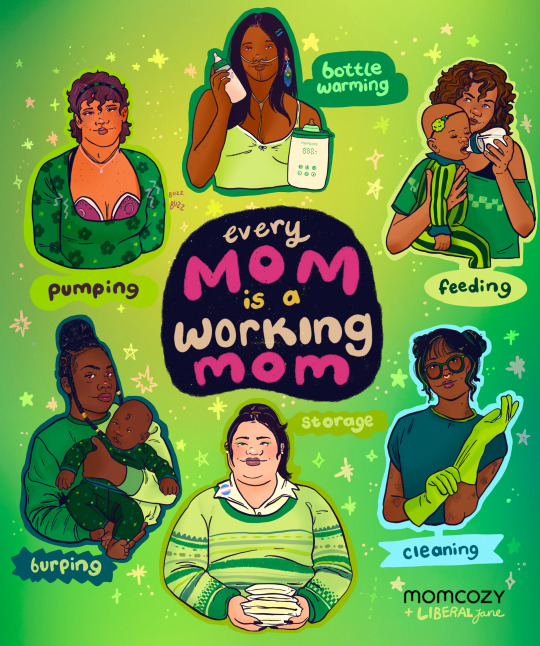
Reproductive labor is work -- typically designated to women -- that is required to sustain human life. It's unpaid, and is often invisible or unnoticed.
This includes tasks like cooking, cleaning, caring for children and more necessary to raise future generations. It's time to bring visibility to this labor, and acknowledge it for what it is: work. Far too many women and fems take on the bulk of household and domestic tasks in addition to having full time jobs -- also known as the 'second shift.' It's time to end gender inequality at home.
I was super excited to work with @Momcozy, who is working to provide comfort and companionship to parents from pregnancy through your child's early years. ❤️ parenthood is already hard enough, why not be comfy? their hands-free pump allow for on-the-go feeding and is designed with your body in mind.
There should be NO moral judgment given to how people choose to feed their children. Formula & chestfeeding are both valid. You have to do what’s best for you, your baby and your life
💚 Wanna try their products yourself? Momcozy is offering 10% off with code LIBERALJANE
* * Image description: Digital illustration of six parents doing different jobs related to chestfeeding. Around the circle shows, 'pumping, bottle warming, feeding, cleaning, storage and burping.' In the center there is text that reads, 'every mom is a working mom.'
#art#feminism#feminist#reproductive care#care workers#domestic work#unpaid labor#gender inequality#sponsored
394 notes
·
View notes
Text
I've been trying to experiment with femininity here and there, using women's clothes and displaying my huge birthing hips and fat ass. My hourglass shape shown off, denouncing my female anatomy.
My fiancée requested me yesterday to shave my pussy. I've done so and got carried away. I shaved every centimeter of my body, except my face. All those years of T and my body is still a woman's. I rubbed one of while shaving, thinking about how dysphoric that would make me feel and how much more of a proper wife he's turning me into. And now that I am indeed dysphoric, I can't wait for my fiancée to come here and fuck me in my fakeboy cunt, spraying his seed against my cervix and breeding me into the most feminine I can be: heavily pregnant, curvy, with enlarged udders. I'm just training to be your breeding bitch, when I am large and heavy carrying yours, so undeniably female.
Every time he insults my womanhood by saying I wouldn't be able to birth naturally because there would be no passage, I get wetter and hornier. I want to prove him I'm a proper mommy, and I want him by my side, telling me I'm a good girl and that I should just let my mother instinct take place, because that's what girls are for while I'm birthing his seed. i want him to remind me every second of it of how I'm now his woman, his wife, and that to accept my girl biology. You're the man, you are smarter than me. I should just put myself in my female role and obey the male. My job isn't to think, it's to carry and birth your children. Yours is to think, because my mind is all "pregnancy brain" from the moment I understood that was my duty.
#ftm breeding#ftm impregnation#ftm pregnancy#ftm sub#trans breeding#breeding k1nk#misgender kink#detrans kink#forced feminized#orientation play#lgetsd#ftm misgendering#ftm detrans kink#ftmtf kink#ftmtf breeding#ftmtf girl#ftm girl#patriarchy kink#serve the patriarchy#bioessentialism#impregnate her#impregnation kink#bimboification#dumbification#corruption kink#birth kink#labor kink
250 notes
·
View notes
Text




Deungdae issue about female machinists (1964)
#dprk#deungdae 등대#magazine#ryongsong machine complex#industry#feminism#gender equality#juche#communism#labor#photography
200 notes
·
View notes
Text
I’m already over the delivery driver discourse but it’s so funny how leftists will put your head on a spike if you dare say prostitution is slavery because “sex work is real work!” and “prostitution is the oldest profession in the world”. Yet it’s perfectly sound to call delivery drivers “burger slaves”.
Somehow it’s more degrading and debilitating to drive to a restaurant, pick up food, and deliver it to someone’s house. THATS slavery.
Yet this 👇🏾 isn’t



#and this isn’t me trying to act like those types of jobs aren’t labor#and that the workers aren’t heavily mistreated by both the companies and many entitled customers#but come the fuck on… slavery? yet prostitution isn’t? girl ok#radblr#radical feminist safe#radical feminism#radfem#men hate you#i hate men#moids#moid moment#radical feminists do touch#radical feminist community#radical feminists please touch#radical feminists please interact#radical misandrist#radical feminst#radical feminists do interact
117 notes
·
View notes
Text




523 notes
·
View notes
Text


2K notes
·
View notes
Text
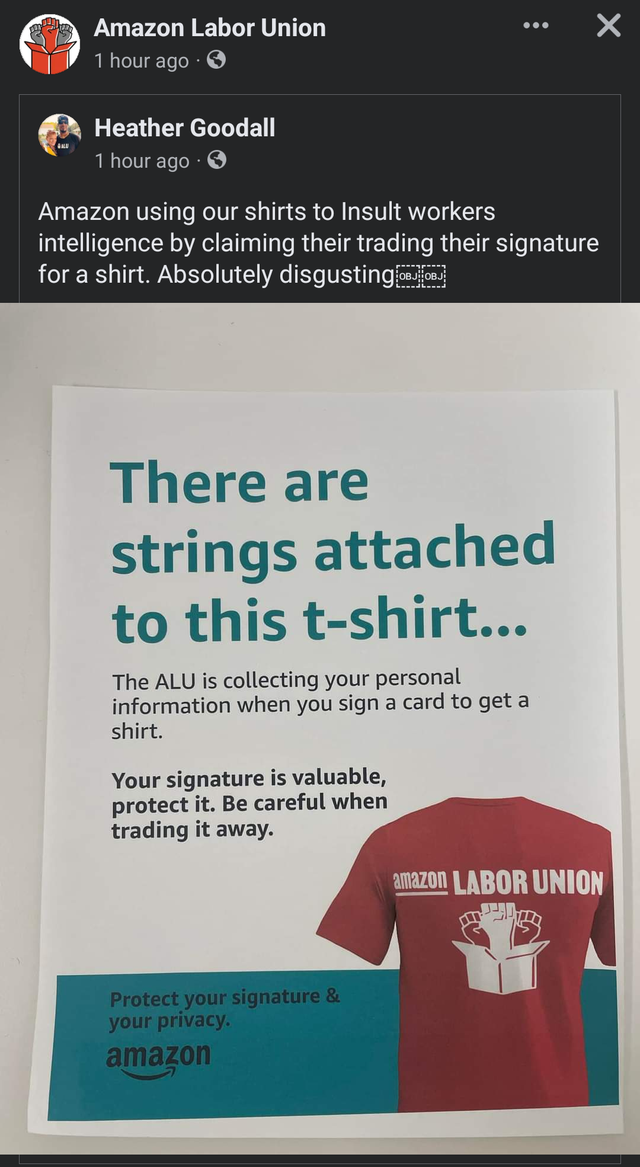
amazon telling their workers to not join a union because they are concerned about *checks notes* privacy
#unionization#unionize#radical feminism#radical feminists do interact#feminism#radblr#unionise#amazon labor union#amazon union#amazon unionisation#alu
224 notes
·
View notes
Text
A newspaper in my country has interviewed Siddharth Kara, one of the experts on what's going on in the cobalt mines in Congo. I think it's very well explained and a must-read to get an overview of this huge human rights violation that is going on. So here I translate it to English, hoping it will reach more people.
Siddharth Kara: "Every time we buy a new mobile phone, we put our foot around the neck of a child in the Congo"
Interview with the author of Cobalt Red: How the Blood of the Congo Powers Our Lives
"The poorest people in the world, including tens of thousands of children, dig the earth in toxic and very dangerous conditions to find cobalt," says journalist and writer Siddharth Kara (Knoxville, Tennessee, USA, 1974). The rechargeable batteries of our mobile phones, tablets, laptops or electric vehicles need this mineral that thousands of children, men, women and elderly people extract from the Congolese mines in inhumane conditions. Kara went there because he had specialized in research on slavery, and in Congo he found a modernized form of slavery. "Time has passed, but the colonial mentality has not," he explains. Everything he saw there and what was explained to him is recounted in Cobalt Red: How the Blood of the Congo Powers Our Lives (a book that does not have a translation into Catalan, but which has now been translated into Spanish, by Capitán Swing). The photographs and videos illustrating this interview were taken by himself.
—Was it difficult to write this book? —Yes. Firstly, because of the specific difficulty of this area of the Congo: very dangerous, very militarized. There are armed militias. And for the local people there it is dangerous to talk to foreigners, because it can bring them consequences. It was difficult to get there, and then it was difficult to build trust with the people who worked there. I only managed it thanks to this trust, which we achieved little by little, until we were sure that we could do the research with guarantees and ethically.
—What drove you to the Congo cobalt mines? —I had been doing research on slavery since 2000. Around 2016, some African colleagues contacted me and said: “Siddharth, something terrible is happening in the cobalt mines of the Congo, maybe you should go there”. I had no idea what cobalt was. I thought it was a color used for painting. I didn't know it was used for rechargeable batteries. It took me a couple of years to grasp its importance. Then I started making contacts to travel there, and in the summer of 2018 I went there.
—And what did you find there? —The suffering and degradation I saw there were so intense that I decided to return there often to write a book. Hundreds of thousands of the world's poorest people, including tens of thousands of children, dig the earth in toxic and very dangerous conditions to find cobalt and put it into circulation, in a distribution chain that goes to the rechargeable devices and cars that people like you and me use every day. It was a human apocalypse, a total invasion of human rights and the dignity of the Congolese people.
—Could you describe what a mine like this is like, physically? How should we imagine it? —Those who are at the top of the economic chain of cobalt exploitation like to distort the truth, and use the term "artisanal mine". This way, they evoke a kind of picturesque activity, but on the ground it is a dangerous and degrading job. A mine of this kind is a mass of tunnels, pits and trenches filled with thousands of people who dig with shovels, pieces of metal or directly with their bare hands. They fill a sack with earth, stone and mud. Some children rinse it in toxic pools to separate the mud from the cobalt stones, which a whole family pours into another sack. It might take twelve hours to fill a forty-kilo sack or two. For each sack they get paid a few euros, very few, and that's how they live every day. They survive.
This video was filmed by Siddharth Kara: [you can watch the video in the interview link, freely available without any paywall, here]
—Is there any rational organization in these mines? Is there someone who decides who does what to optimize work? —Well, there is a whole gear designed so that the poor and the children of the Congo produce hundreds of thousands of tons of cobalt every year. There, work is usually divided by age and gender. Digging tunnels, which requires a lot of strength, is usually done by young men and teenagers. The digging of small pits and trenches that can be less meters deep is done by women and smaller children. Rinsing this toxic cobalt is usually done by the children. The merchant system to exploit these families and sell the cobalt they produce to the formal industrial mines is very well set up.
—What else do these people at the top of the chain invent? —Another fiction they invent is that there is a difference between industrial and artisanal mining, and that they only buy from the industrial one, where there is no child labor. Not true: all cobalt is mined by children. All the cobalt that the children and peasants extract goes straight to industrial mining. In addition, there is no way to separate what comes from a bulldozer and what comes from a child, once it all pours into the same place in the facility that does the industrial processing before this cobalt is sent out of the Congo.
—You explain that the situation is particularly abusive for women. —Yes. It is a lawless land, and violence is the norm. Women and girls always bear the brunt: they are victims of physical and sexual violence, and almost no one talks about it. It is a major tragedy: they are victims of sexual assaults that are committed in the mines themselves, while they collect the cobalt that we have in our mobile phones.
—You refer to all of this as a new episode of slavery. It is not the first time that the Congo has a decisive material for Western economic development. It happened with uranium for nuclear bombs, for example. History repeats itself. —Exactly. It is important for people to understand that we are not witnessing an isolated case, but the latest episode in a long, very long, history of looting of the Congo, a very resource-rich country, dating back to the colonial period. The first automobile revolution required rubber for tires. The Congo had one of the largest rubber tree rainforests in the world. King Leopold [of Belgium] deployed a mercenary army of criminals and terrorists to enslave the population and make them work to get it. This inspired Joseph Conrad's novel Heart of Darkness. The Congo also has abundant reserves of gold, diamonds, nickel, lithium and other metals and minerals that make components for electronic devices…
—These mercenaries deployed by King Leopold, are they still there today, in one way or another? —Yes. On the ground there are militias, or the army, or private security forces that the mining companies hire and that, sometimes, in addition to monitoring, do the work of recruiting children. Under the threat of an occupation, they force an entire town to dig. It's atrocious: we live in an age of supposed moral progress, where everyone shares the same human rights, and yet our global economic order has its knee on the necks of the children and the poor of the Congo, with this huge demand for cobalt that has to fuel the rechargeable economy.
—Has no Western country or international body done anything to stop it? —No. No western country, no government, no big business has lifted a finger to address this tragedy. They talk about maintaining human rights standards in their supply chains, they talk about environmental sustainability, but it's only talk. That is why it is very important that journalists and researchers set foot on the land of the Congo and listen to what the Congolese have to say: that no one protects their rights or their dignity, that they are erasing the environment, that mining it is not done in a sustainable way and the whole countryside is polluted and destroyed by the mining operations. It is enough to walk ten minutes around a mine to see it.
—Does the same happen in all mines? Large Western companies that use cobalt often claim that theirs comes from artisanal mines that meet standards. —Have they gone there? There is no decent mine in the Congo. It does not exist. I'll be happy to take any CEO of any tech company to their mines, where their cobalt comes from. We'll stand there, watching them extract it, and take a selfie with it. Everyone will realize that what is seen behind us is not decent. You will see destruction, millions of trees felled, installations that emit toxic gases that fall on the surrounding towns, on the children, on the animals, on the food. There is no decent mine in the Congo. And they know it. But who will believe the voice of a Congolese if they can drown it out with proclamations of human rights while they continue to make money without measure?




—Can you explain the role China plays in all of this? You say that it controls the supply chain. —Yes. China controls about 70% of mining production in the Congo. Why do we accept China saying its mines are decent, if they don't even protect the human rights of their own people? Why do we accept a technology company or a car manufacturer saying, "My Chinese partners say they protect human rights there, and that's enough for me"? Why do we accept it?
—Why do you say that a certain transition to green energy is absolute hypocrisy? —When the calls in favor of this transition consist of proposing to consumers that they buy electric vehicles instead of gasoline cars, this is hypocrisy. Because the cobalt and other elements that are used for the batteries of these cars are extracted using methods that are catastrophic for the environment. While in one part of the world we say we want to save the environment and leave a greener planet to our children, in another we are destroying both the planet and the future of their children. How can you save only part of the planet, turning the rest into a toxic dump? How can we give a green planet only to our children, while we let other people's children die? This is hypocritical.
—It is a reflection of the domination that the global north maintains over the south. —We have never given Congo the opportunity to benefit from its own resources. It is a colonial mentality: time has passed, but the colonial mentality has not. It is the same type of colonial plunder from a century and a half ago. It is colonial to say: "Look, we need this, they have it, we take it from them in any way and, when we no longer need it, we leave a catastrophe behind us". There are companies that, recently, have started to pretend that they are becoming aware of this and promised that they would try to use batteries that did not have cobalt, but in reality they said: "Well, we've been caught, we'll look for another mechanism". And they do nothing to solve the catastrophe. Even if we no longer needed cobalt tomorrow, we would have to repair the destruction we have caused these past fifteen years.
—It's the big companies who should be required to react, but what do you think a Western consumer who has gotten upset reading you could do? —The first step to progress in the conquest of human rights is always to make injustice known. Contribute to make everyone knows. Most people are good and, in their hearts, want no part of injustice. It is the few who move based on avarice and greed who pollute the rest of humanity. Outreach and awareness is the first step because it will inevitably activate a lot of people. Change always starts like this. In the case of cobalt, the second step is to think about our consumption habits. Every twelve months, the technology company I bought my phone from offers me a new one. Do I really need it? Every time we buy a new mobile phone, we put our foot on the neck of a child in the Congo. Better think twice, then.
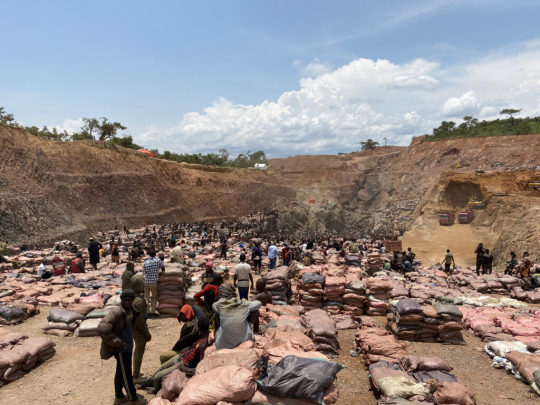
#congo#human rights#electric vehicles#electric cars#colonialism#labour rights#china#environmentalism#rape culture#feminism#slavery#africa#cobalt#labor rights#anti racism#free congo#siddharth kara#childrens rights#history#💬
183 notes
·
View notes
Text
Song of the day
(do you want the history of your favorite folk song? dm me or submit an ask, and I'll do a full rundown like here)
youtube
"Bread and Roses"
Judy Collins, 1976
since its labor day i thought we could talk about some good ol' IWW labor history
in 1911, Helen Todd gave a speech about women's suffrage and ended it
"Not at once; but woman is the mothering element in the world and her vote will go toward helping forward the time when life's Bread, which is home, shelter and security, and the Roses of life, music, education, nature and books, shall be the heritage of every child that is born in the country, in the government of which she has a voice."
James Oppenheim, inspired by this speech, created the poem "Bread and Roses" in 1911, whose words would later become the lyrics for the judy collins song.
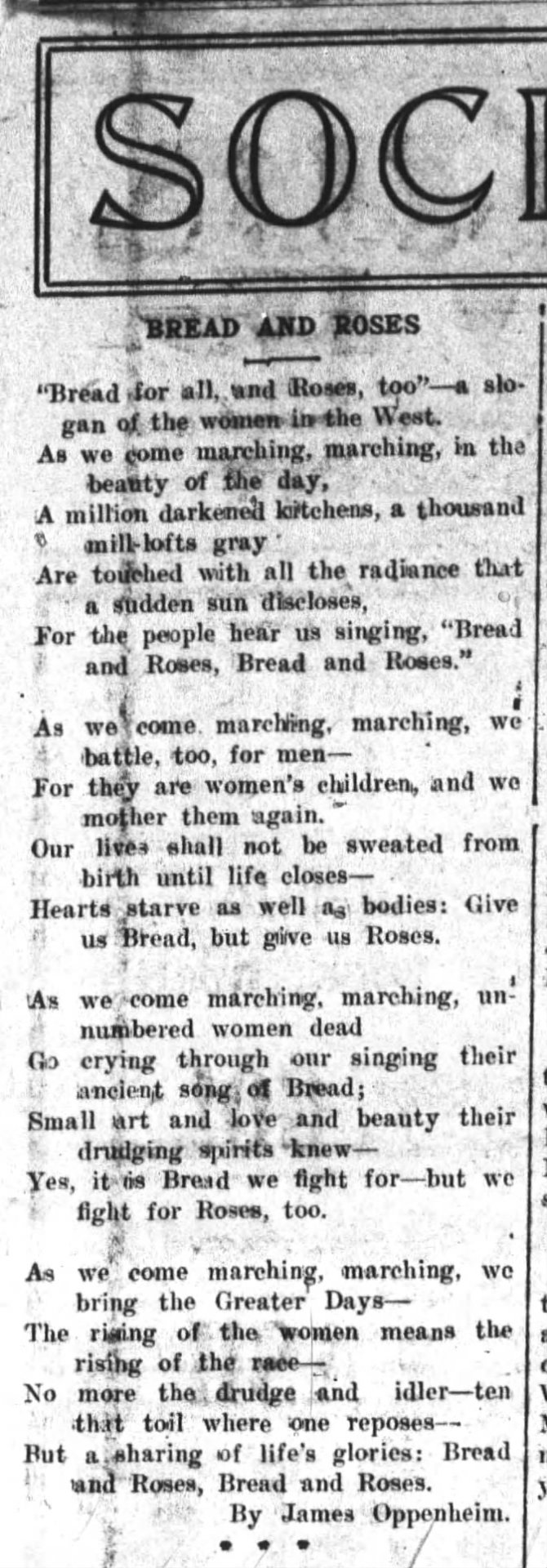
in 1912, 30,000 immigrant textile workers in Lawrence, Massachusetts, went on strike due to poor working conditions and poor pay. this strike was led by the International Workers of the World and was comprised mostly of women. the phrase "bread and roses" was all over signs and became the slogan of the strike, with it even being called the "Bread and Roses Strike". like many strikes in the USA it was absolutely brutal for the strikers, and several people died, but they were able to win some of their demands.

in 1970, the James Oppenheim poem was put to music by mimi fariña, and then covered by judy collins. my favorite cover is by Utah Phillips in 1983 , where he explains the history of the textile strike and the meaning of the slogan
Hearts starve as well as bodies; give us bread, but give us roses 🌹
#women of folk#american folk revival#folk revival#traditional folk#labor songs#union history#labor history#iww#iww history#protest folk#socialist history#feminism#womens suffrage#women's history#bread and roses#worker rights#american folk#american history#history#judy collins#utah Phillips#Youtube#song of the day
52 notes
·
View notes
Text
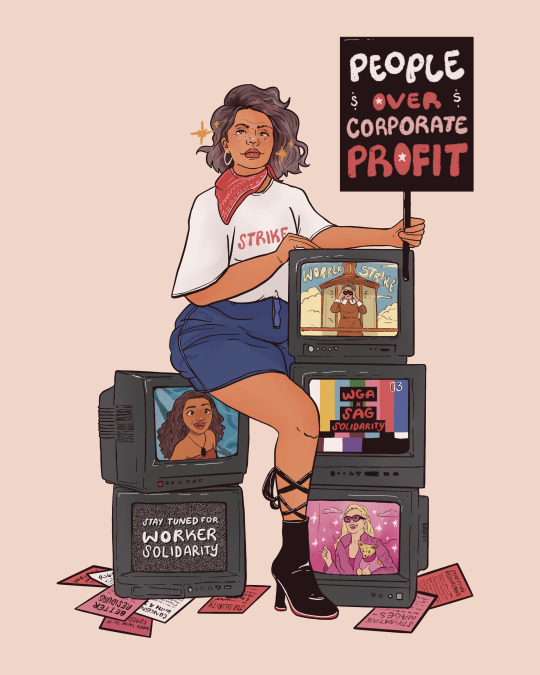
WGA and SAG-AFTRA's strike for the Minimum Basic Agreement are reasonable, long overdue, and FAIR!
Digital illustration of a fem workers wearing a white t-shirt and jeans with a red bandana around their neck. They are sitting on a stack of TVs with various movie scenes and text that reads, 'stay tuned for worker solidarity.' They are holding a sign that reads, 'people over corporate profit.'
#art#feminism#labor rights#wga#sag aftra#writers strike#strike#labor strike#actors strike#workers rights#worker solidarity
735 notes
·
View notes
Text
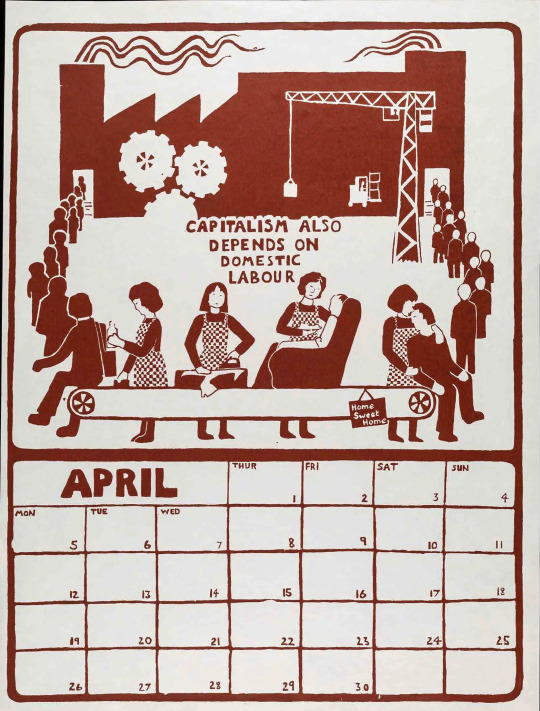
"A feminist silkscreen poster collective founded in London in 1974 by three former art students, the See Red Women’s Workshop grew out of a shared desire to combat sexist images of women and to create positive and challenging alternatives. Women from different backgrounds came together to make posters and calendars that tackled issues of sexuality, identity and oppression. With humor and bold, colorful graphics, See Red expressed the personal experiences of women as well as their role in wider struggles for change." Red Women’s Workshop, 1975
408 notes
·
View notes
